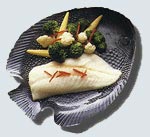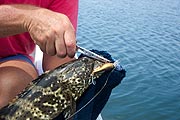| 1. Check the Australian Marine Conservation Society (AMCS) ‘Sustainable Fisheries’ website: www.amcs.org.au/campaigns/sustainable_fisheries/index.html
|
|
2. The AMCS recommend not buying any of the following seafood:
| Overfished species |
Also known as |
| Tropical rock lobster |
Coral crayfish, painted cray |
| Sea cucumber |
Sandfish, Beche-de-Mer, trepang |
| Black teat fish |
Surf red fish, Beche-de-Mer, trepang |
| Orange roughy |
Deep sea perch, sea perch |
| Redfish |
Nannygai, red snapper |
| Blue warhou |
Trevally, sea bream |
| Eastern gemfish |
Hake, king couta, silver kingfish |
| Southern scallop |
Commercial, king or Tassie scallop |
| Southern bluefin tuna |
Tuna |
| School shark |
Flake, snapper shark, tope |
| Silver trevally |
Silver bream, white trevally |
| Bigeye tuna |
Tuna |
|
Activity 3: Student choices
Activity 6: Consumer choices

Orange roughy
|
3. When you are at the seafood counter in the supermarket or at a fish shop, ask about the different fish species on offer:
a. Is the species long-lived (more than 20 years), or slow growing?
b. Is it a deep sea species?
c. Is it a shark or a ray?
If the answer to any of these questions is yes then say no thanks! |
|
| 4. If you see a fish for sale called ‘reef fish’, ‘cod’ or ‘prawns’ – please say no because these aren’t species names. |
|
| 5. Ask your school canteen if they know where their seafood is coming from. If not, why not see if you can find out for a class project and then make recommendations as to the most sustainable seafood choices that your school canteen could make. |
Activity 2: Your school canteen |
| 6. The AMCS also recommend avoiding imported seafood. Imported seafood often comes from countries with very damaging and unsustainable environmental practices. We are often told nothing about how imported species are caught or farmed or where exactly they come from. Choose Australian seafood first. |
Activity: Can we run out of fish? |
| 7. Please avoid salmon or trout, if you can, because these are grown in damaging sea cage aquaculture farms – AMCS recommends you say no. |
|
| 8. Learn about fishing gear and aquaculture farming techniques – some are more sustainable than others. |
Activity 4: Commercial fishing equipment
Activity 5: Ghost nets
Activity 8: Aquaculture |
| 9. Do you know where you should and shouldn’t fish? Find out if you have a marine protected area near where you live. If so, what is it called? |
|
| 10. Catch only what you need to eat and no more. |
|
| 11. Always return undersize regulated species to the sea and do it quickly. Know your bag limits. |
Activity 7: Maths using fish |
| 12. Make sure that you use circle hooks. These only catch the fish by the mouth and prevent gut hooking, giving the fish the best chance of survival when released. |

Circle hook |

Octopus hook |
|
| 13. When you catch a fish or other marine animal, such as squid, and you are intending to return it to the water, do not have the fish out of the water for longer than 90 seconds maximum - 30 seconds is about right. One way to ensure that you do this is that when you take the fish out of the water, hold your breath – when you have to take another breath, put the fish back! |
| 14. Handle your catch with a wet towel or other wet material, never with dry hands and never with hands that have had sunscreen on them. |

How to release a fish |
| 15. Cover the eyes of your caught fish with a towel or something else dark to prevent them being blinded by the sun. |
16. When releasing a fish, always support it under the body while it revives in the water, before letting it go.
See Activity 1: Released fish survival |
| 17. Use a dehooker or long-nosed pliers to very quickly take out the circle hook. If necessary practice this on an orange or a banana at home, so you do not waste time and you do not harm the fish any more than you have to. |

Using a dehooker |
| 18. Take ALL your rubbish home with you and ensure that it does not blow away while you are fishing – plastics such as bait bags and fishing line do not degrade quickly and fishing line is renowned for maiming many marine animals. |
| 19. Always use a line that is appropriate to the weight of the fish you are aiming to catch – if the line is too light it will break and the fish will have to swim around with a hook in its mouth (or possibly its gut), trailing a length of fishing line. |
|
| 20. Never leave your fishing line unattended or a seabird might become entangled in it. |
|



